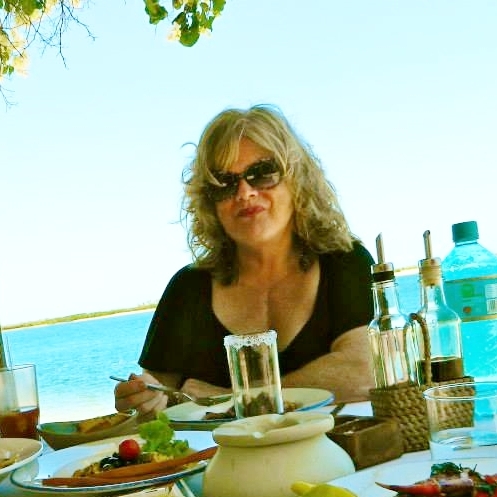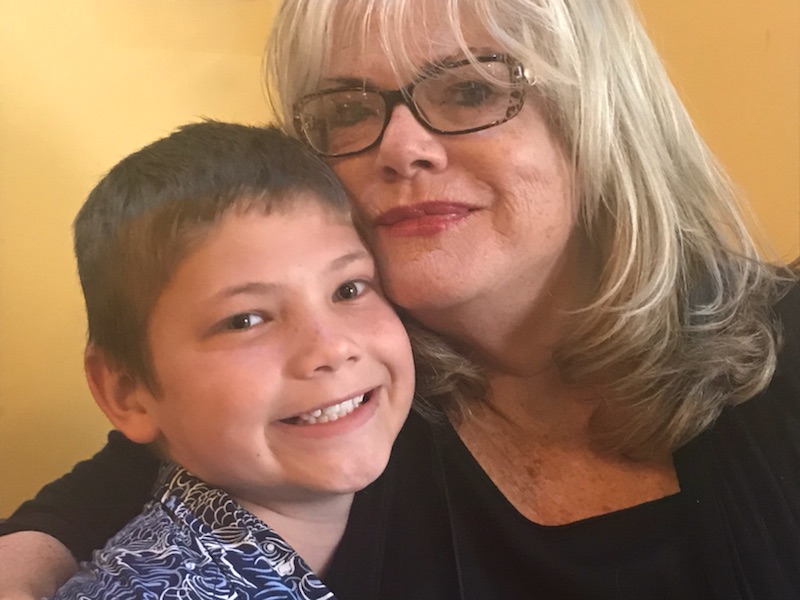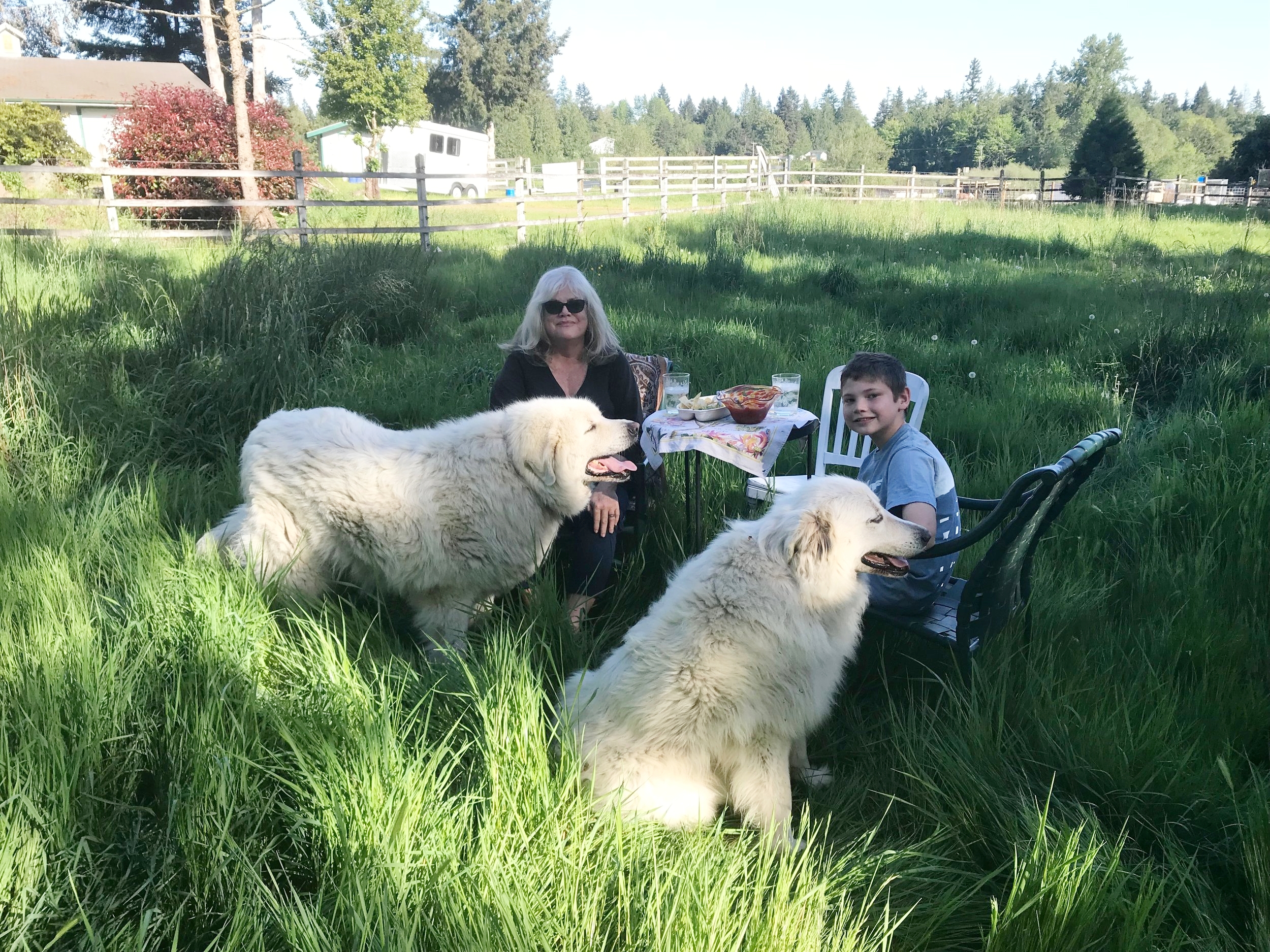If you’ve been following the Vibe blog and social channels as of late, you’ll notice that we’ve been publishing more and more stories about the extraordinary people who come through our doors, whether it’s to work, meet or socialize. Every day, we’re humbled by the untold stories, experiences, perspectives of the people here in our (greater Kitsap) community.
“I’ve always been a nomad. For now, home is right here in downtown Poulsbo.” Vibist Susan O’Meara grew up in California before moving to New York, Los Angeles, Ireland, Kenya, South Africa and now Poulsbo.
Our humble little wish? For everyone to get the chance to hear—and be inspired by—those stories in the same way that we are.
Enter wordsmith extraordinaire, Susan O’Meara.
If anyone’s got stories to tell, it’s this gal. With the sleekest of foldable laptops and a lipstick collection that rivals Sephora itself, Susan is obsessed with wrangling language and messaging that helps brands, businesses and individuals grow and shine. Ever upbeat, optimistic and enthusiastic, we knew she was a Vibist at heart from the moment we met her.
If there’s one thing Susan loves, it’s a good story. Susan is someone who knows exactly how to suck the story you didn’t know you had right out of you. Think we could find someone better to tell the stories of the Vibe Tribe? Not a chance.
Over the next months, be on the lookout for a regular line-up of great reads by Susan about all of the awesome people that make up the Vibe community. But before we get there, you’ve got to hear her story—the story of a woman who ‘lives dangerously and thinks magically’… and has inspired us all to trade our bucket lists for sparkle lists, instead.
Where’s home for you?
Susan: Metaphorically, home is wherever my son Tiger is, but I still don’t feel that I’ve found my one true home, where I’m meant to be in a forever kind of way. I’ve always been a nomad.
For now, home is right here in downtown Poulsbo. A sweet spot in every sense. True neighborhood, gorgeous views of Liberty Bay and the Olympics, super safe. We’re in kind of a throwback town to a time that stood still. I keep finding clues to my own childhood, and my son is making memories that I remember—riding stingray bikes at sunset, fishing and swimming off the docks, popping down to the village market for bubble gum. All that great kid stuff. (Not to mention the wine tasting, farm to table, and breweries for us big kids.)
How/why (and when) did you end up in Kitsap?
Susan: In December 2014, we moved from Nairobi to Stanford, a tiny village of about 3,000 people in South Africa, about 90 minutes southeast of Cape Town. A total Mark Twain situation—river running through it out to Hermanus Bay, wild coastline where whales calve, an old-time ferry boat like The African Queen going up and down, children walking barefoot to school (and everywhere else), old-fashioned ice cream shop in the four-block town, that sort of kid heaven.
data-animation-override>
“There’s an everyday kind of richness to the African way of life. I think my son Tiger and I will always ache a bit for what we left behind.”
Stanford was surrounded by this ring of scrubby, majestic mountains, ripe farmlands, and sweeping vineyards. We had great family friends around the corner from our little big-porched bungalow. The food scene was brilliant; every Friday night we had dinner at Graze, which raised, harvested and sourced every ingredient locally. Not an hour south lay Cape Agulhas where the Indian and Atlantic oceans meet. Spectacular, every which way you turned.
It was by far the most stunning place I’d ever been, and that seemed to include all six senses. But the immigration agency filed the renewal for our visas a day late, and we had 30 days to leave the country. South Africa is incredibly bureaucratic and doesn’t favor foreigners. The segregation situation is still bad, so it’s pretty understandable. Still, leaving was a crusher. Fortune came calling, though, as an old family friend’s house was empty on Fjord Drive, ready and waiting for us.
There’s an everyday kind of richness to the African way of life. I think my son Tiger and I will always ache a bit for what we left behind.
What chance encounter changed your life forever?
Susan: It was a place, not a person. Actually both. In 2005, I was living in Dublin, Ireland (I’m half Irish, my father was born in Tipperary). A dear friend was heading to Kazakhstan to adopt a son and invited me along. I’d never been to Central Asia and was intrigued by the journey Anne was making. It was a lark, really.
A chance trip to Kazakhstan with a friend changed Susan’s life forever, opening up the chance to adopt her son, Taidgh.
We got to the orphanage on this super-stark spring day; I remember that the sky felt low. In a neighborhood of supreme poverty, we found the “baby house,” as they called it, surprisingly clean, modern and caring, unlike stories you’ve heard about those in Russia, Romania and China.
That was it. All those kids, love at first sight. That trip to the country’s cultural capital, Almaty (called the Paris of Central Asia), forever altered the course of my life. I’d never considered adoption before that. In the summer of 2008, I would return to meet and bring home my own son, Taidgh. His nickname is Tiger, but his given name is Timothy in Irish. It also stands for poet, philosopher, prince in Gaelic.
You’ve had an incredible career path. How did it start?
Susan: I was just out of grad school with a degree in creative writing. Pretty hilarious in that marketplace.
My first job in Manhattan was working at WAACI (Warner Amex Corporate Communications, Inc.) as an assistant for the EVP of film and event cable television. We were just down the hall from the execs who had created MTV. Then we were scooped up by Showtime and started a pay-per-view channel, which included concerts, movies, boxing and other sports, launching the first Wrestlemania ever to be delivered by satellite.
Don King and Mike Tyson would roll down the hallways, and I ended up having to go to Vegas for a lot for fights, by that time doing event promotion. One of the fearless VPs had been road manager for The Beatles as a teenager. It was that kind of nutty, spectacular, surprising, sharp-minded players that spearheaded the entertainment technology for pay-per-view, the precursor of on-demand. I relished it, being a part of that very tight team, in on the ground floor of a network.
What inspires you?
Susan:
- Good coffee. Man, I’ve become a serious espresso addict since moving to the Pacific Northwest. Gotta mainline it in the mornings.
- Time with Taidgh.
- Brainstorming, whether personal or professional.
- Difficult people who surprise you with hidden kindness.
- A blank page.
- Stuart Weitzman shoes.
- Detective thrillers, preferably Scandinavian.
- Exploring somewhere completely new.
What’s the favorite project you’ve ever worked on?
Susan: Probably being one of the minds behind By bread alone: In the company of food heroes, a global documentary series, has been the most exciting project. We traveled around Ireland, Italy, Kenya and the US to interview and shoot farmers, artisan producers, fishermen, tribal members, chefs, cheesemakers, restaurateurs, winemakers, etc., gathering their stories about how breaking bread or sharing a meal or providing nurturing and traditional foods can promote conversation, combat starvation and bring peace, even in conflict zones. A foodie/television producer in France is interested in working with us. It’s on the shelf for now, but ya ever know.
I think my absolute best projects may still be in store. I got approached last month about potentially working as a marketing consultant for a puppet museum. That could be a lot of fun and make for several amusing stories about my toy/circus phobias.
Tell us about some of the places you’ve lived and worked. Where is the most interesting place you’ve been?
Susan: I grew up on the Central Coast and in the Bay Area of California. Then New York to Los Angeles, off to Ireland and into Africa. Hands down, the most exotic, mind-blowing, intriguing and alarming place I’ve ever lived and worked is Nairobi.
data-animation-override>
“I think my absolute best projects may still be in store. I got approached last month about potentially working as a marketing consultant for a puppet museum. That could be a lot of fun and make for several amusing stories about my toy/circus phobias.”
Nairobi is completely out of control in every sense. Troops of baboons running across the highways; lions in people’s backyards; and no end of spouse-swapping. No rules. No infrastructure. Lawless. Yet irresistible. On one hand, I haven’t made friends like I did there since college; on the other, I never felt more compromised, while always compulsively pushing the envelope.
However, before we moved there, someone mentioned to me that not only do kids in Africa have a good childhood, but also a long one. I found that to be very true in raising Tiger there. It’s just that I rediscovered my inner child, too, and that felt crazy to me! Time to grow up and then some.
You were recently named a finalist for the Pacific Northwest Writers Association’s literary contest (non-fiction category) for an unpublished piece you wrote in and about Kenya. Tell us what that’s about.
Susan: In 2011, I went behind the scenes on the Lion Warriors shoot for National Geographic, headed up by documentarian Kire Godal. She was covering a critical story about how the Maasai were slowly recognizing that their tradition of killing lions (as a rite of passage) was endangering tribal sustainability. Protecting big cats is a big contributor to dollars from eco-tourism. So, in the Chuylu Hills in southeastern Kenya, the Mbulia Group Ranch is encouraging young Maasai to instead become lion guardians, protecting wildlife, using alternative measures of their manhood (e.g., sporting events), and looking after their families in a fashion that creates livelihood. My piece is called “Lion-Hearted in Maasailand.”
As a human, as a writer and as a creative, how does the environment that you’re working in impact you and the work that you do?
Susan: It is all and everything. Depending on what exactly I’m writing, I want different environmental ingredients. I’ve talked to you about when I’m doing serious editing—gotta be in an armchair at home or in a café. When I’m task-oriented and sure-footed, Vibe works its magic. Also, it’s a terrific great for conversation and connection when I need to lift my head up from the page that glares back at me. I’m alternately productive and skirting my assignments.
How did you first get introduced to Vibe Coworks? What was your first impression, walking in the door?
Susan: I was hired by RFG Creative to write the content for Craig Nelson’s Food Automate website. RFG Creative was a Vibe member, so I had the chance to do work from the Vibe Lab and experienced an immediate sense of homecoming, of neighborliness. It just felt right and relevant, being here and becoming a part of Vibe.
data-animation-override>
“I had the chance to do work from the Vibe Lab and experienced an immediate sense of homecoming, of neighborliness. It just felt right and relevant, being here and becoming a part of Vibe.”
What made you say yes, when Alanna asked if you’d be up for helping to tell the stories of your fellow Vibe members?
Susan: Completely enthusiastic! One of my greatest experiences has been becoming a journalist later in life, working for several East African publications. The opportunity to help tell the stories of the members here at Vibe felt like such a natural progression of my connection with Alanna, Marcel and the Vibe Tribe itself. I’ve loved getting to know the community here anyway and am delighted to discover more about who’s here, who’s doing what, their dreams, passions and perspective.
Take us behind the scenes in your work. How do you get from blank page to uber compelling story, article, book, web copy. etc.?
Susan: First, there’s wonderment, a person or situation or opportunity really speaks to me. I feel in my gut that other people would like to also experience that story, and I literally leap into it. Immerse myself. I do tons of research, ask lots of questions, and map everything in my mind. And then I let my brain chillax so that the threads and loose moving parts come together for, I hope, some magic in the writing of the piece. You want to pull others in and keep them there—for just a bit. Another take or taste of what the world is like for others.
If your life were a book, what would its title be?
Susan: Life Without a Net: My Years of Living Dangerously and Thinking Magically.
What hobby would you get into if time and money weren’t an issue?
Susan: Simply more traveling for both me and Tiger. My sparkle list includes walking the Namibian desert with bedouins, all the way to the Skeleton Coast; cooking school in Italy; the Galapagos; safari in Botswana; Cinque Terre…you get the drift. Never enough adventure to be had.
I’d also become a shoe lobbyist, buying more pairs of Stuart Weitzmans, and collect rings from Boodles.
How do you relax after a hard day of work?
Susan: Good television and great wine—and glamming it up with make-up from Ulta Beauty. (I have probably 60 lipsticks in every man-made shade possible.) Also, I love to cook—I make a mean slow-cooked pork butt.
I feel truly alive when I _______________.
Susan: Leap without looking.
What would you like to see on your headstone?
Susan: Undimmed.



